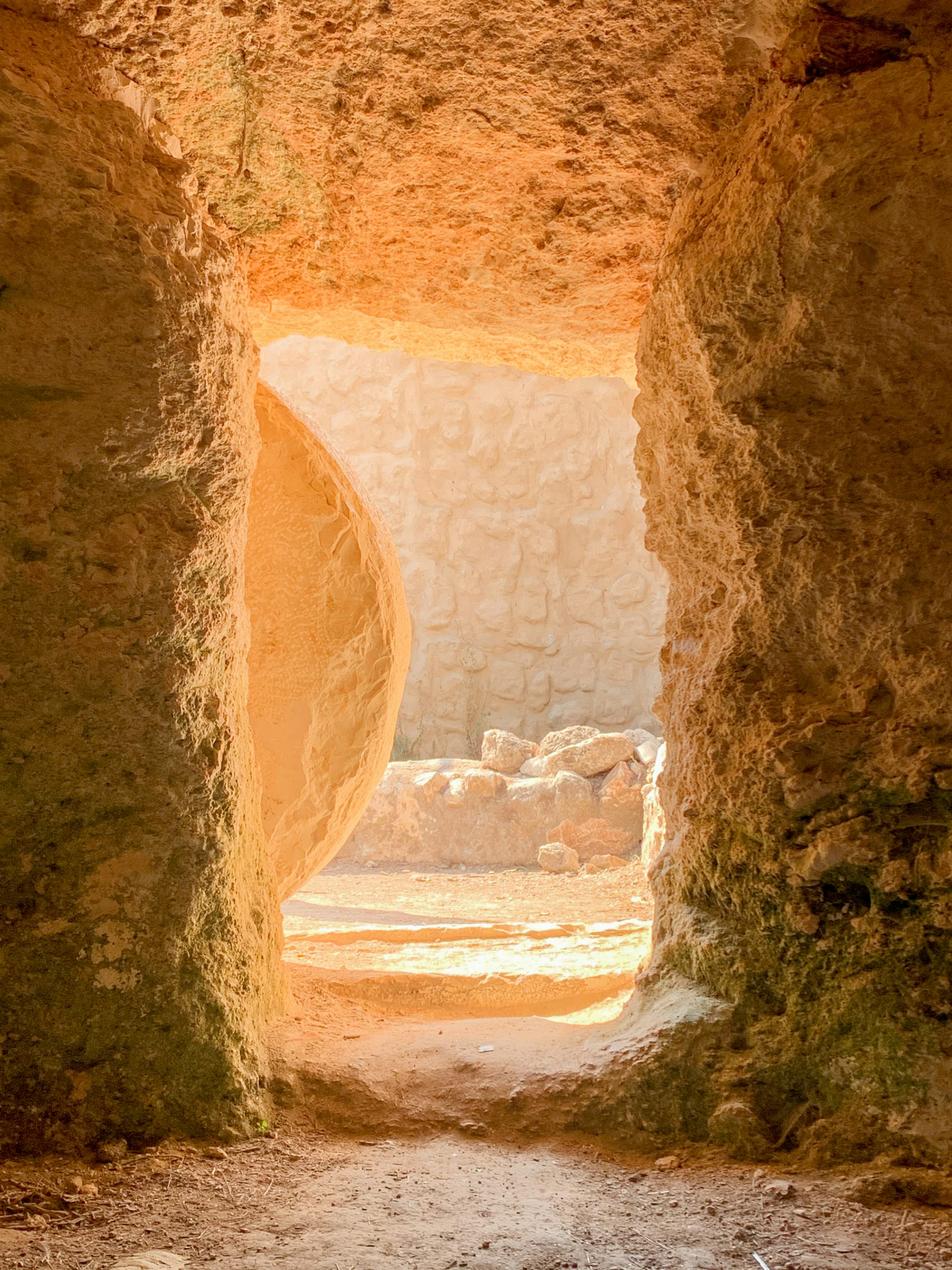Christians believe the almost unbelievable: a dead man, three days in a cave-like tomb, suddenly drew a breath of air, de-mummified himself, rolled back an enormous stone, and walked out of the tomb, victor over death.
With Easter's arrival, it's an important time to remember the claims of first-century Christians: "We have seen Jesus alive from the dead."
That's a pretty bold claim. Last time I walked by a cemetery, I didn't see any examples of this. Every grave was quiet.
The claim of resurrection doesn't afford middle ground, nor an apathetic response. Squishy indecision comes from gelatinous minds, unwilling to think things through. In today's parlance, one can't get away with, "The resurrection is your truth." Peter didn't run around crying, "Jesus is alive ... I was just talking to him ... and that's my truth." Nonsense. It either happened or it didn't.

If Jesus didn't rise from the dead, it's a hoax. But if he did, it's the greatest event in history. No middle ground (this may disturb you if you want everyone to get along, but facts don't care much about feelings). Examining the alleged resurrection of Jesus won't allow you to stake out an in-between or subjective position. Peter articulates the most staggering truth – or he's lying through his teeth.
So, it's a big question: Did Jesus Actually Rise from the Dead?
I'm not the world's foremost apologist (though I recently slept at a Holiday Inn Express, so I'm good to go). I enjoy thinking and reading – but even more, I enjoy packaging important thoughts in cogent, memorable ways. I hope this helps.
Five Alternate Resurrection Theories, Debunked
Over the past 2,000 years, five alternate theories have been postulated to contradict the claim that Jesus got up from the dead. They are:
1. His Disciples Stole His Body
Let's set the stage. Jesus is crucified on a Friday and declared dead by 3pm. His body is taken down and put in a tomb before nightfall (when the Sabbath begins and all work is suspended). A huge stone is rolled against the door of the tomb and a guard (thought to be 4-30 Roman soldiers) is stationed there.
The tomb is sealed with ...
"a soft, moldable substance, probably clay, that was imprinted with the Roman imperial seal and attached to the stone with a rope. Breaking the seal would incur the Empire’s wrath — if someone could get past the guards." – Ligonier Ministries
And we have 11 disciples, all grieving the brutal execution of their dearest friend, the Messiah. Even if they counterintuitively felt inclined to steal Jesus' body, how would they get past the Roman Guard (especially when the Guard were well-trained soldiers, under threat of execution for sleeping or leaving their post)?

It all seems too unlikely. But let's give the skeptic the benefit of the doubt. Let's pretend that the 11 stole the body of Jesus. If so, then logically ...
- Each of the 11 knew they stole the body.
- Therefore, each of them knew it was a complete lie that Jesus rose from the dead.
- However, these 11 men were all eventually executed for their claim that "Jesus is alive, and I've seen him" (except for the apostle John, who was exiled on Patmos).
- If they admit to stealing the body, they'll avoid execution. In fact, if only one of them changed his story, Christianity would have never launched. Yet not one of them folded.
- Of course, we can find 11 persons who will die for a lie ... but they will think they are dying for the truth. We can't find 11 persons today who will die for a lie, knowing it is a lie. But this is precisely what we'd have to conclude about the 11 – they died like fools for a lie, knowing it was a lie, because they were there when they stole the body.
- Put more simply, if you and 10 friends stole Jesus’ body and told everyone "he’s alive" ... then a gun was put to your head and you were ordered to confess or die, what would you do? If you know you stole it, you'd confess. Who would die for a lie, knowing it's a lie? Even if one of you were stupid enough to die for your conspiracy, the other 10 would “squeal” to save their lives. Right? Why did all 11 men die for their claim of seeing Jesus resurrected?
Charles Colson put it this way:
“Men will give their lives for something they believe to be true—they will never give their lives for something they know to be false.”
What other explanation can account for the disciples' sadness turned to gladness, hopelessness to hope, fear to courage? The resurrection alone.
2. The Authorities Stole His Body
Perhaps the religious authorities (who hated Jesus) stole his body? But, that's the last thing they wanted! They’d heard Jesus predict He would rise again. They sure didn't want to give the impression he had done so! Instead, their strategy was to secure the tomb with the Roman Guard.
But again, let's take the position of the skeptic. Let's pretend the authorities stole Jesus' body. If they possessed Jesus' body (or knew where it was), then at the moment the disciples began preaching a resurrection, why didn’t they retrieve the body, put it in an F-150 pickup chariot, and parade it down the streets of Jerusalem? This would have quashed Christianity in its infancy. Logically, they must not have had the body.

John Warwick Montgomery put it this way:
“It passes the bounds of credibility that the early Christians could have manufactured such a tale (of resurrection) and then preached it among those who might easily have refuted it, simply by producing the body of Jesus.”
3. We've Been Visiting the Wrong Tomb (Whoops Theory)
Maybe the disciples are preaching a resurrection and showing an empty tomb, but Jesus is actually buried some place else? It's quite a stretch when you think about it. Suddenly, has everyone forgotten where Jesus was buried? On Sunday morning, did the women not recall where the tomb was? And the disciples? Even if they all had sudden amnesia, certainly the Jewish authorities knew where it was. So did the Roman Guard! So did Joseph of Arimathea (who owned the tomb). It takes so much faith to make this conclusion.
By the way, if everyone had been visiting the wrong tomb, the authorities (who knew the location and stationed a guard there) would have wasted no time in producing the body from the correct tomb. If the actual empty tomb of Jesus were not an established fact, the disciples could not have preached a resurrection in Jerusalem for one hour. Everyone would have consulted with the authorities, then walked over to the tomb and checked it out.
I've heard far better conspiracy theories. And remember, we would still need to explain why the disciples would be willing to die, when they would have known they never saw Jesus alive from the dead. Who would do that?
4. Swoon Theory
In the movie, The Princess Bride, Wesley dies at the hands of a torturer. But his body is taken to Miracle Max (played by Billy Crystal), who famously says,
"He's not dead; he is just mostly dead. There's a big difference between mostly dead and all dead."

This theory submits that Jesus wasn't all dead, but merely mostly dead. Jesus fainted; he swooned. But recall the data of Jesus' death:
- Crucified – savage, brutal, ending in asphyxiation.
- Extreme blood loss
- Spear in his side (piercing the pericardium, which issues blood and water – a sign of death)
- Wrapped in linen and spices that begin a mummifying, cast-like effect. 75 pounds of it.
- Even the Centurion at the cross (an expert in death) recognizes Jesus is dead.
Nevertheless, Jesus somehow revived in the tomb, pushed aside a two-ton stone, overpowered 4-30 Roman soldiers (guards), then crept off (half-dead) and convinced his disciples he was a victor over death. Um, really? (If this seems compelling, I'm selling some swampland in Florida you might like).
The death blow to the Swoon Theory comes from the unbelieving skeptic, David Strauss, who said:
“It is impossible that a being who had stolen half-dead out of the (tomb), who crept about weak and ill, wanting medical treatment, who required bandaging, strengthening and indulgence, and who still at last yielded to his sufferings ... could have given to the disciples the impression that he was a Conqueror over death and the grave, the Prince of Life – an impression which lay at the bottom of their future ministry. Such a resuscitation could only have weakened the impression which He had made upon them in life and in death; at the most [it] could only have given an elegiac voice but could by no possibility have changed their sorrow into enthusiasm, [or] have elevated their reverence into worship.”
5. Hallucination Theory
This final theory speculates that no one actually saw Jesus alive, but rather they all hallucinated seeing him. I guess in our drug-dosing culture, this kind of theory can gain some traction ... until we look at the specifics.
Recall that over 500 people claim to have seen Jesus alive at the same time (1 Corinthians 15:3-6). However, this contradicts all known findings of hallucinations. When people hallucinate, they see different things. I may see a pink elephant, but you’ll see a purple flamingo. Another may see a giant Twinkie. There is no evidence of mass hallucinations where people see the exact same thing.

By the way, even if we ceded to the skeptic that Jesus' post-death appearances were all hallucinations, why didn't the authorities produce the body from the tomb to squelch these stories of a resurrection?
6. Final Theory
Using critical thinking skills, it seems obvious that these five theories have insurmountable challenges. But if these five aren't true, what is? Where is Jesus' body? Why did those eleven go to their deaths proclaiming Jesus is alive, especially if he weren't and they knew it? What can explain the persecution that early Christians were willing to endure ... other than a resurrection? Their lives were radically changed by something. What? Maybe it was exactly as they said: Jesus is alive!
PS I found an old manuscript of a speech I gave in college, for my Argumentation and Debate Class. The title was, The Resurrection: Hoax or History? See if you can read the Professor's note. ☺



